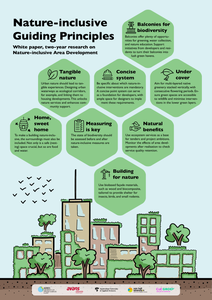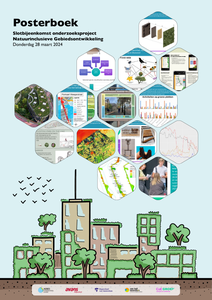Het Knowledge Mile Park (KMP), momenteel de drukste verkeersader van Amsterdam, wordt de komende jaren uitgebreid vergroend. Op diverse locaties langs de KMP werd steekproefsgewijs hittemetingen uitgevoerd om hittestress op te sporen, verkoelingscapaciteit van het aanwezige groen te meten en het thermisch comfort van de KMP voor de gebruiker te inventariseren. Er werd volgens het Cool Towns Heat Stress Measurement Protocol (Spanjar e.a., 2020) hittemetingenuitgevoerd met mobiele weerstations, infraroodcamera’s en vragenlijsten. Uitgevoerd op twee opeenvolgende dagdelen tussen 17.00 tot 20.00 uur. Dit vond plaats op 21 en 22 augustus 2023 toen de luchttemperatuur 23-25 °C bereikte. De resultaten geven het hitteverloop van een milde warme zomerdag weer. Uit de enquête afgenomen onder KMP-gebruikers blijkt dat meer dan de helft van de respondenten op zowel het Weesperplein als het Wibautpark het als een beetje warm of neutraal ervaren. De meetresultaten komen overeen met Europees hitteonderzoek (Spanjar e.a., 2022) en laat zien dat op locaties in de zon zoals op het stenige Weesperplein en het grasveld, mensen tussen 17.00 en 18.30 uur te maken hebben gehad met een sterke tot extreme hittestress condities (35 tot 45 °C PET, zie Grafiek 1). Op de drie andere locaties verminderen boomkronen de hittestress tot licht of niet aanwezig. Verharde locaties blootgesteld aan de zon warmen op en verminderen het thermisch comfort verder door de werking van infraroodstraling. De uitkomsten van de enquête maakt het belang van het goed reguleren van het thermisch comfort op de KMP zichtbaar.
DOCUMENT

Universities have become more engaged or entrepreneurial, forging deeper relations with society beyond the economic sphere. To foster, structure, and institutionalize a broader spectrum of engagement, new types of intermediary organizations are created, going beyond the “standard” technology transfer oces, incubators, and science parks. This paper conceptualizes the role of such new-style intermediaries as facilitator, enabler, and co-shaper of university–society interaction, making a distinction between the roles of facilitation, configuration, and brokering. As a case study, the paper presents the Knowledge Mile in Amsterdam as a novel form of hyper local engagement of a university with its urban surroundings that connects the challenges of companies and organisations in the street to a broad range of educational and research activities of the university, as well as to rebrand the street.
DOCUMENT

Urban nature enhancement is a theme that needs to be considered across different scales. From pocket parks and façade-greening to urban green infrastructure, biodiversity thrives best through connectivity.In the SIA-project, Nature-inclusive Area Development, four universities of applied sciences - Aeres University of Applied Sciences, Avans University of Applied Sciences, Amsterdam University of Applied Sciences, and Van Hall Larenstein University of AppliedSciences- researched three levels of area development to accelerate the transition to nature-inclusive area development. The study consisted of three case studies: Waarder Railway Zone (building), Knowledge Mile Park (KMP - street - Amsterdam), and AlmereCentre-Pampus (area).
DOCUMENT

Knowledge of child development influences parental expectations of, and interactions with, children. Studies have shown that maternal knowledge supports cognitive and social–emotional development of young children and can have long-lasting benefits. Level of developmental knowledge of parents and grandparents has seldom been investigated on a population level. Our aim was to compare Canadian and Dutch samples of urban parents and grandparents in terms of normative knowledge of children’s cognitive and social–emotional development. Urban parents (n = 379) and grandparents (n = 174) from the province of Alberta, Canada (N = 553) and parents (n = 634) and grandparents (n = 96) of the city of The Hague in the Netherlands (N = 730) answered questions related to knowledge of cognitive and social–emotional development of young children, including topics such as “do children have stronger bonds with parents who stay at home instead of working outside the home?” and “do children learn more from hearing someone in the same room talk than hearing someone on TV?” Overall, the Canadian respondents were more likely to answer these questions correctly. In both samples, women were more likely than men to answer correctly. No significant relationship between age or role (parent or grandparent) and knowledge was identified, but there was a positive correlation between knowledge and level of education. Little is known about international differences in caregivers’ knowledge about normative child development. This study suggests that differences exist. Understanding differences between countries in parental knowledge may provide insight into cross-cultural variability in child behavioral and developmental outcomes. https://doi.org/10.1177/2158244018777027
DOCUMENT

In het SIA-project Natuurinclusieve Gebiedsontwikkeling onderzochten vier hogescholen - Aeres Hogeschool, Avans Hogeschool, Hogeschool van Amsterdam enHogeschool Van Hall Larenstein - drie schaalniveaus van gebiedsontwikkeling om de transitie naar natuurinclusieve gebiedsontwikkeling te versnellen. Gekoppeld aan driecasussen waren dit: gebouw (Spoorzone Waarder), straat (Knowledge Mile Park - KMP - Amsterdam), en gebied (Almere Centrum-Pampus).Tijdens de slotbijeenkomst van het project was er een posterexpositie georganiseerd waarbij op de posters de belangrijksteuitkomsten van diverse deelonderzoeken werden gepresenteerd. De posters van onderzoekers en studenten zijn in deze publicatie gebundeld.
DOCUMENT

Stedelijke natuurversterking is bij uitstek een thema dat door de schalen heen moet worden bekeken. Van pocket park en gevelbekleding tot stedelijke groenstructuur, de biodiversiteit komt het beste tot bloei door samenhang.In het SIA-project Natuurinclusieve Gebiedsontwikkeling onderzochten vier hogescholen - Aeres Hogeschool, Avans Hogeschool, Hogeschool van Amsterdam en Hogeschool Van Hall Larenstein - drie schaalniveaus van gebiedsontwikkeling om de transitie naar natuurinclusieve gebiedsontwikkeling te versnellen. Gekoppeld aan drie casussen waren dit: gebouw (Spoorzone Waarder), straat (Knowledge Mile Park - KMP - Amsterdam), en gebied (Almere Centrum-Pampus). De casussen belichten veelvoorkomende typen ingrepen, zoals kleinschalige nieuwbouw, verbetering van de publieke ruimte, en binnenstedelijke woningbouw. Ondanks dat elke case een eigen thematisch zwaartepunt had - biobased materialen (Spoorzone Waarder), natuurlijke vergroening (KMP), en governance (Almere) - heeft via deelonderzoeken en tussen hogescholen kruisbestuiving plaatsgevonden. De white paper geeft de belangrijkste resultaten en lessen hiervan weer.Urban nature enhancement is a theme that needs to be considered across different scale levels. From pocket parks and façade greening to urban green infrastructure, biodiversity thrives best through connectivity.In the SIA-project Nature-inclusive Area Development, four universities of applied sciences - Aeres University of Applied Sciences, Avans UAS, Amsterdam UAS, and Van Hall Larenstein UAS- researched three scale levels of area development to accelerate the transition to nature-inclusive area development. This was linked to three case studies: Waarder Railway Zone (building), Knowledge Mile Park (KMP - street - Amsterdam), and Almere Centre-Pampus (area). The case studies represent common types of urban interventions, such as small-scale new developments, improvement of public space, and inner-city densification. Despite each case having its own thematic focus - biobased materials (Waarder Railway Zone), natural greening (KMP), and governance (Almere) - cross-pollination took place through sub-studies and collaboration between universities. The following pages present the main results and lessons learnt.
MULTIFILE

Across European cities local entrepreneurs are joining forces in new ways, forming collectives to stimulate business growth and innovation and to create a more attractive business environment. The value of such collectives is increasingly recognized by local governments and policy measures to stimulate these initiatives are being developed. Amsterdam hosts different collaborative initiatives, including 39 business improvement districts (BIDs).The Knowledge Mile is such a collective in which shopkeepers, other local SMEs, residents work together to collectively improve a large retail area. The city of Amsterdam is also a stakeholder. Government can fill an important role in enabling the creation of collective resource management in urban settings. However, if effective regulation is missing, citizens and governing bodies have to look for incentives to find new means of addressing governance. As such, the potential for collective management of urban commons may be greater than realized so far, as there is still a lack of knowledge in this area. In this paper, we aim to bridge this gap. By means of an embedded case study approach, we analyze the interaction between the stakeholders in their development of a green zone, the Knowledge Mile Park, in the Wibautstraat. In the coming years, roofs, facades and ground level will be changed through a collaboration of residents, entrepreneurs, researchers, civil servants and students in a metropolitan Living Lab. In this Living Lab, solutions for a healthy and social environment, climate resistance and biodiversity are jointly developed, tested and shown. In our study, we will analyze the role of the governing bodies in such initiatives, and make recommendations how collectives can become more mainstream with new kinds of institutions, without an undue burden on the community.
MULTIFILE

Poster en begeleidende audio uit de guided tour van het Open Atelier van CoE Groen op 7 december 2023 over het project Natuurinclusieve gebiedsontwikkeling. In dit project wordt onderzocht wat de knelpunten en kansen zijn voor een transitie naar natuurinclusiviteit bij gebiedsontwikkeling en welke handvatten ontwikkeld kunnen worden om de transitie te versnellen. Het project richt zich hierbij op drie aspecten van natuurinclusieve gebiedsontwikkeling: biobased bouwmaterialen, natuurlijke vergroening en governance. Deze onderdelen wordt onderzocht door middel van drie verschillende casestudies: Spoorzone Waarder voor gebouwniveau, Amsterdam Knowledge Mile Park voor straatniveau en Almere Centrum-Pampus voor gebiedsniveau. Het tweejarige onderzoek wordt uitgevoerd door een consortium van vier hogescholen en diverse werkveldpartijen. Via zogenaamde versnellingssessies worden resultaten opgehaald en gedeeld met praktijkpartners.
MULTIFILE
Human and plant relationships are described within the rich tradition of multispecies ethnography, ethnobotany, and political ecology. In theorizing this relationship, the issues of functionalism, and interconnectivity are raised. This article aims to re-examine the position of plants in the context of contemporary urban spaces through the prism of environmental ethics. Despite conceptual plurality and socio-cultural complexity of human–plant relationships, social scientists fail to note how the perception of ‘greenery’ has objectified plants in urban environment. Without seriously considering bioethics, theories of human–plant relationship might fail to note exploitive anthropocentric relationship between humans and plants in urban spaces. The article is inspired by reflections of urban flora in Amsterdam, The Netherlands. https://doi.org/10.1016/j.scs.2013.01.007 https://www.linkedin.com/in/helenkopnina/
MULTIFILE

This paper reports on a multiple-case study of five participants in a school-university research network in a Dutch master's program. Outcomes indicate that use of existing network structures in master's programs is complex, but could be a promising avenue for creating succesful school-university networks.
LINK